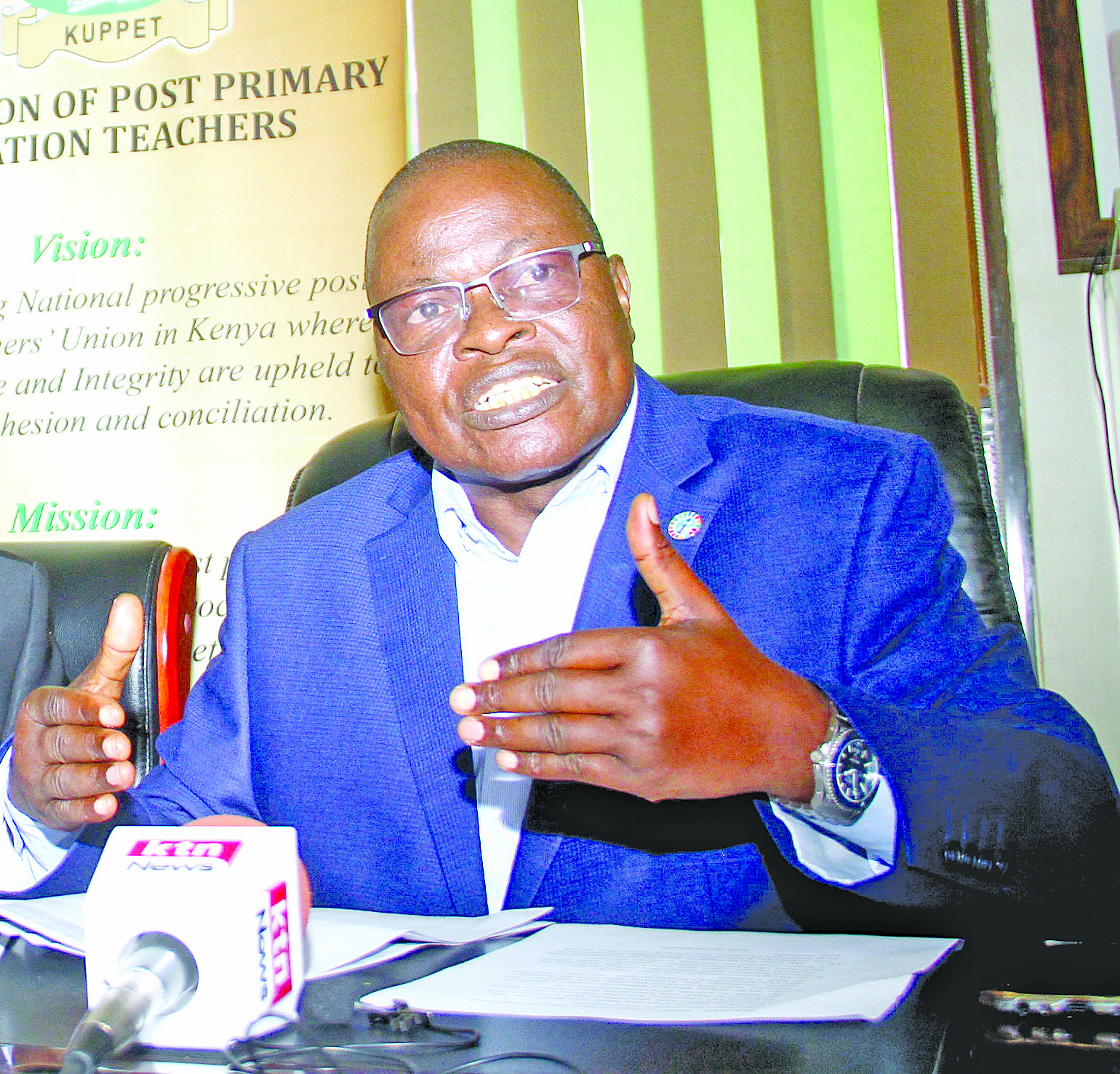Strike truce disowned by a section of Kuppet officials

A storm is brewing in the Kenya Union of Post-Primary Education Teachers (Kuppet) over the recently called-off nationwide strike with teachers at the grassroots now baying for the blood of the union’s top leadership for allegedly betraying them.
A section of officials at the national office and several branches are now calling for the resignation of Kuppet Secretary General Akello Misori, Chairman Omboko Milemba and other top officials.
Kuppet assistant national treasurer Ronald Tonui and branch secretaries Sabala Inyeni (Vihiga), Faith Kebut (Baringo), Joseph Abincha (Kisii), Paul Rotich (Nandi), and Robert Miano (Laikipia) said the teachers were left “empty-handed” after participating in the strike for two weeks. Instead, the union officials claim, their top leadership was convinced into accepting the implementation of the second phase of the Collective Bargaining Agreement (CBA), that saw teachers being awarded a paltry Sh1,000.
Tonui claims that only five members of the National Executive Board (NEB) were involved in the secret negotiations to call off the strike while himself, Sammy Chelang’a and Edward Obwocha were sidelined. Milemba was away as he was bereaved.
However, according to minutes from the meeting, Tonui is seen to have signed the statement. Streamlining medical cover According to Tonui, the teachers’ priorities included stagnation of their colleagues in one grade, promotion of technical teachers who had been transferred from TSC to the Public Service Commission (PSC), streamlining of the medical cover, payment of special and acting allowances, employment of 46,000 Junior Secondary School (JSS) intern teachers on permanent and pensionable terms, review of career progression guidelines and remittance of third party deductions.
“Instead of the TSC coming up with resolutions on how they specifically intend to deal with all our grievances, they decided to come up with generalities that only gave promises of the issues being addressed subject to availability of funds,” Tonui said, citing the case of a 58-year-old teacher who has remained in one job group for more than 20 years.
About six years ago, the government moved about 5,000 teachers from TSC to the State Department of Vocational and Technical Training under PSC with a promise to formulate a new service scheme for tutors in technical institutions.
The teachers, then serving in Job Group C3 which is equivalent to Job Group L, were then promoted to Job Group N, bypassing Job Group M and without going through interviews.
Though TSC had last year advertised the positions for promotion and went ahead to shortlist at least 159,000 teachers for an upgrade to Job Group N, they only ended up promoting 30,000. On the medical cover, Tonui says the teachers were pushing for streamlining of the current scheme into one seamless medical cover.
Their current insurer, Minet, does not offer a comprehensive scheme like the one enjoyed by civil servants. It limits teachers to a maximum of Sh900 a day, which Tonui notes is too little. Inclusion of JSS interns Tonui and Kuppet branches are also questioning why the Akello-Misori team did not ensure the inclusion of the employment of 46,000 JSS intern teachers on permanent and pensionable terms in the return to work agreement, in line with an earlier court ruling that had declared the move illegal.
Tonui is said to be eyeing a senior position in the teachers’ union and already has memeber coalescing around him with an effort to benefit from the current impasse. Another issue of contention is the government’s failure to implement the 20 per cent special dut and 15 per cent acting allowances to acting principals, acting deputes and acting senior teachers.
The officials argue that while TSC has not been paying teachers holding positions in acting capacities any allowance, it holds them responsible for any mishap, such as a fire outbreak in the school.
When contacted, Akello-Misori blamed the undercurrents in the union on individuals out to make some political mileage. According to him, almost all the issues raised by the teachers were addressed, save for some that the government promised to handle later when funds were available.
“People should learn to appreciate. This was the first time in Kenya’s history that a return-to-work was formally arrived at through consensus and consent registered in court,” the trade unionist said.
He insited that the among the issues achieved by the strike, including the reinstating the slashed TSC budget from Sh11 billion to the original Sh22 billion, revision of career progression guidelines, improvement of Minet insurance services and remittance of third-party deductions.
“It is good to understand some situations and when the government says it does not have money to employ 46, 000 JSS interns, can we force them?,” Akello-Misori asked, adding that those alleged to have not been involved in the return to work negotiations are campaigning for 2026.
“All the members of the NEB who were around were present save for the national chairman who was bereaved,” he observed.











